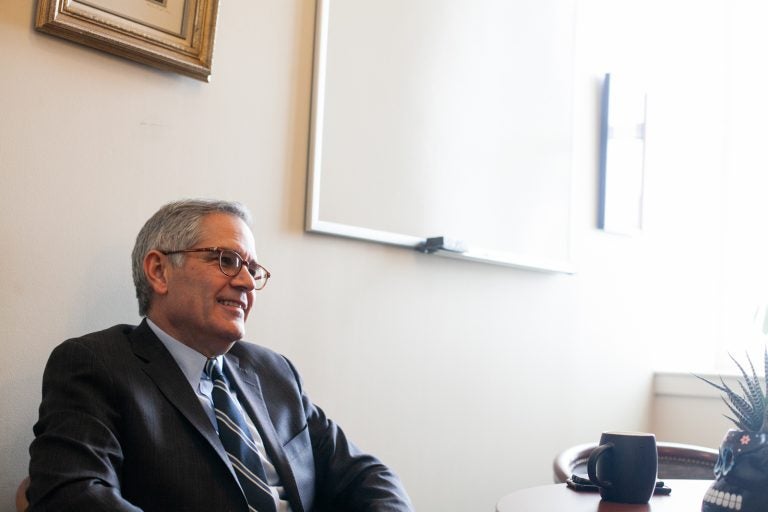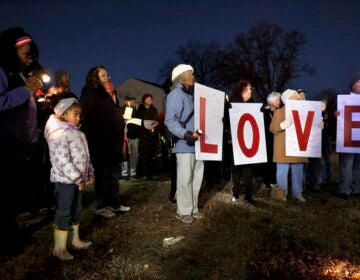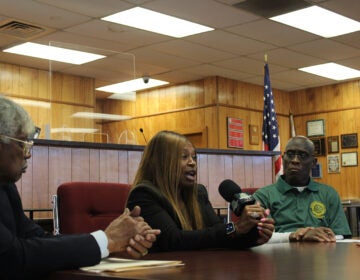Krasner launches truth and reconciliation panel inspired by post-apartheid South Africa’s efforts
The district attorney hopes a new pilot effort will help Philadelphia heal wounds caused by police and prosecutors.

Philadelphia District Attorney Larry Krasner is pictured in the District Attorney's Office in Center City Friday February 1, 2019. (Brad Larrison for WHYY)
After apartheid ended in South Africa, the country spent seven years hearing testimony from victims and perpetrators of the racist system that had divided people by skin color — more than 22,000 statements, and thousands of public hearings broadcast for all to see.
Since 1996, the Truth and Reconciliation Commission has inspired similar efforts elsewhere. Now, Philadelphia is taking inspiration from South Africa as well.
As the United States deals with a legacy of systemic racism in policing and the criminal justice system, District Attorney Larry Krasner has joined his counterparts in Boston and San Francisco in creating Truth, Justice and Reconciliation Commissions.
“The bottom line is something has to be rebuilt when it comes to justice for Black and brown people, coming from policing and from prosecution,” said Krasner, who said prosecutors could play a heinous role in the legal system with a “win at all costs” attitude and by ignoring the need for police accountability.
Krasner went on to say that in order for the city to achieve more justice and safety, a reconciliation would need to take place between prosecutors and police and the communities they have disserved.
How that reconciliation process will be structured will depend on those communities. Two to four employees within Krasner’s office would be tasked to develop the pilot, according to the district attorney, and the community would help craft the statement of intent.
In South Africa, the Truth and Reconciliation Commission served as more than a public record of the injustices Black South Africans experienced under apartheid. Under its three-part structure, It also granted amnesty to those who committed human rights violations and dealt with issues of accountability.
Whatever Philadelphia’s commission sets out to do, Krasner said the community would be able to vet the plans over a few months before members for the commission were picked.
That said, there is no firm timeline for the plans.
“Today, we begin the work,” said Rachael Rollins, district attorney of Suffolk County, Massachusetts, which includes Boston. “This commission was created to turn a moment of outrage into action and reform. We need to confront our ugly past in order to build a more just and equitable future.”
Rev. Gregory Holston, pastor at Janes Memorial United Methodist Church in Germantown and senior adviser on policy and advocacy for the Philadelphia DA’s office, said he has high hopes the commission could complement the reconciliation already happening here.
Under Krasner’s tenure, 14 people, 13 of them Black, have been exonerated after spending decades behind bars for crimes they did not commit.
Holston said their release and the acknowledgment that the legal system got it wrong, is “part of a truth-telling around persecutory and police misconduct that has put many, many people in jail and prison who should not be.”
“The need for this commission is to expand that work in a way that we get more truth-telling and more of the stories to be told over the last 60 years of police and prosecutorial misconduct that has happened in this city,” Holston said.
Efforts to create the commissions are taking place in partnership with the Grassroots Law Project, an organization founded by Lee Merritt, an attorney working in social justice, and activist Shaun King.
On a call Wednesday with reporters, King said that the organization wanted to get more cities in the country to create commissions on their own, and that the Grassroots Law Project would try to help the commissions financially through fundraising.

Get daily updates from WHYY News!
WHYY is your source for fact-based, in-depth journalism and information. As a nonprofit organization, we rely on financial support from readers like you. Please give today.





